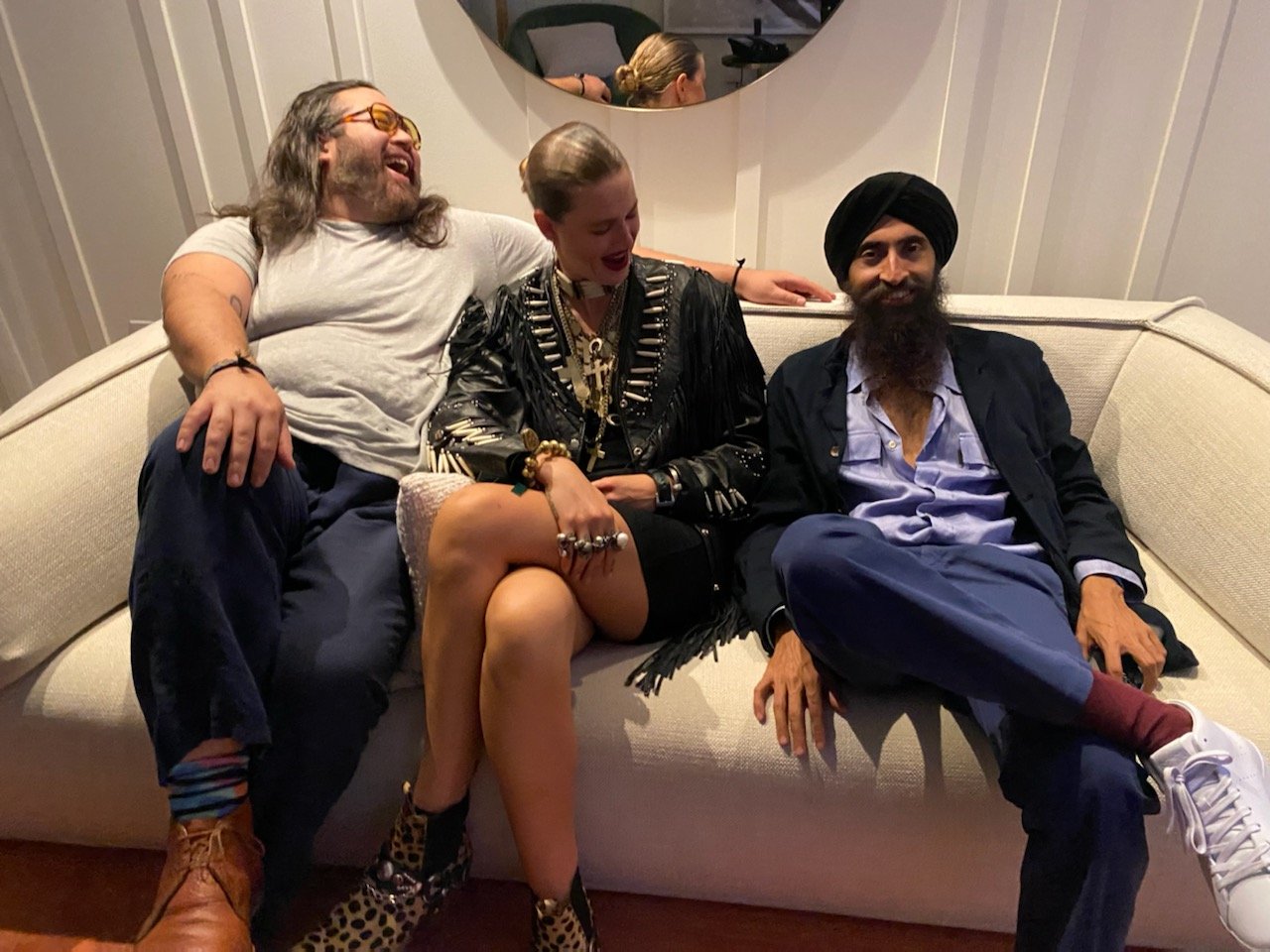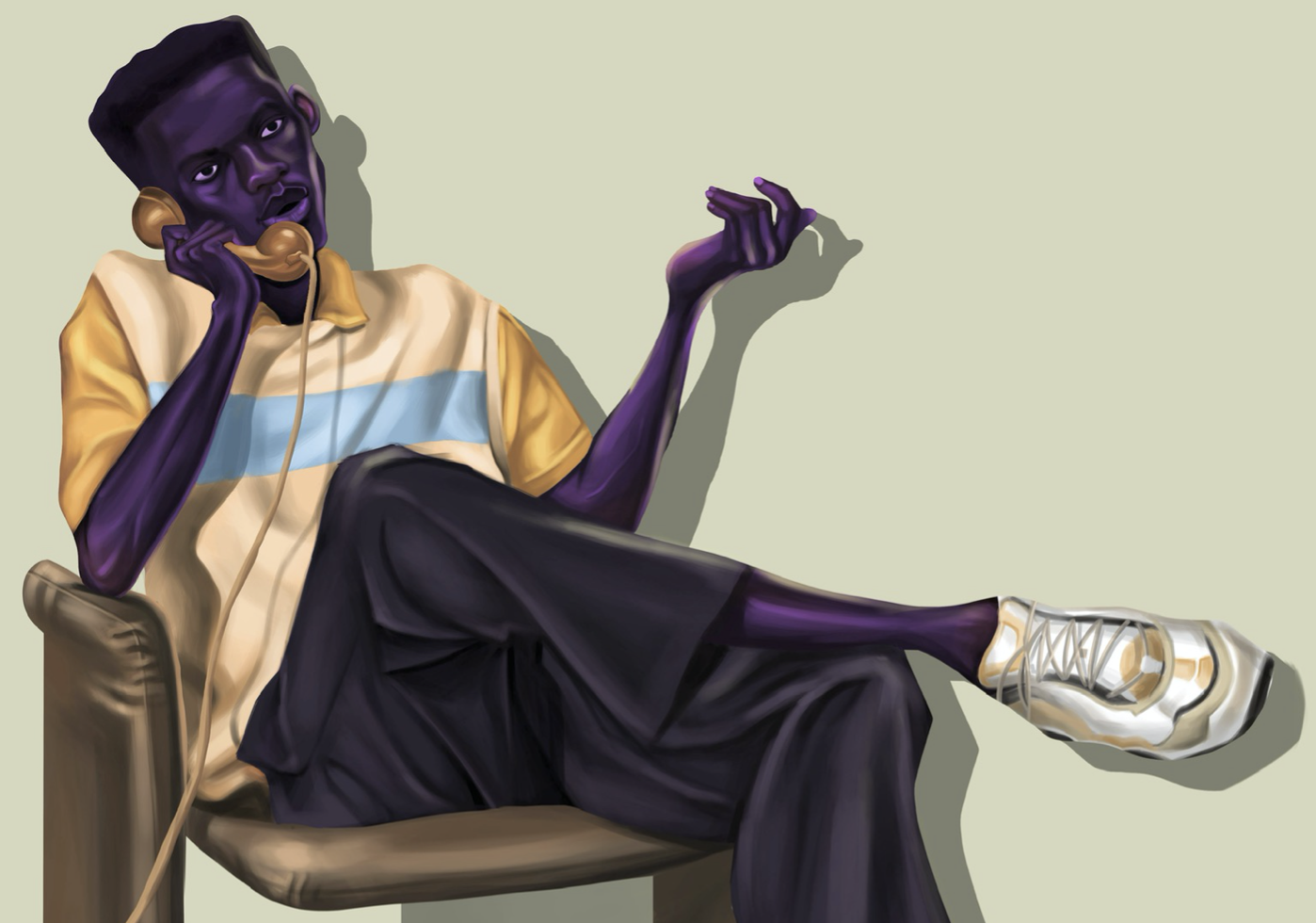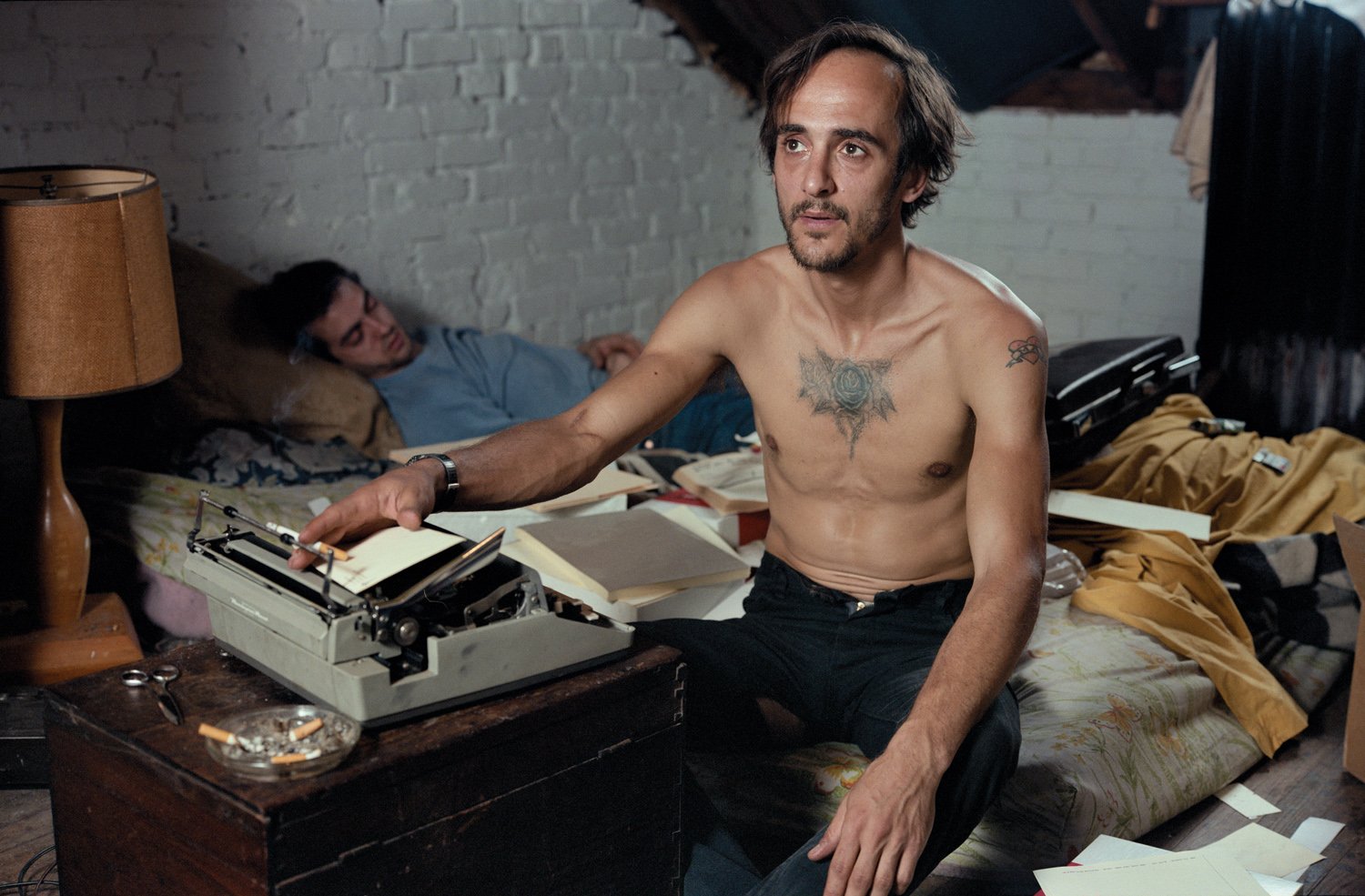photo by Andy Sweet, courtesy of Kino Lorber
text by Harper Simon
In March of 1957 Miles Davis released a compilation of earlier recordings from 1949-1950 after he had left Charlie Parker’s quintet and began exploring a new sound that would come to be known as Cool Jazz. He would call this collection of seminal recordings Birth of the Cool. On December 3rd of 2021 Ivanka Trump and Jared Kushner would make the jaunt from Palm Beach to attend the Louis Vuitton party for Art Basel Miami and swan about unperturbed. Perhaps they’ve been forgiven in the spirit of Chanukah.
I’ve never been to Art Basel and never particularly wanted to go. Or maybe I should just say I never had a real reason other than to be the kind of person who flies around for parties. But this year I am roped in by new friend, artist and art critic Kenny Schachter, who has agreed to get me some NFTs together for my new art and music project Meditations on Crime, currently due for release in 2022. He’s promised to take me to some of the outlaw NFT parties operating outside the stuffy, official events and this sounds intriguing. I don’t know much about NFTs but I appreciate that it is a new and exciting moment and am grateful to Kenny for offering to take the time to explain it to me. Kenny was one of the first critics to write about the emergence of Non-Fungible Tokens and has since achieved a kind of vaulted status in this strange and insular world. He’s even managed to figure out the creative side making a tidy sum selling his own. I am happy for him! But still don’t really understand!
I get in kind of late on a Tuesday and check into the Ritz Carlton which I realize immediately to be a mistake as it is soulless and garish and I already have depressive tendencies. I’m on L.A. time so decide to take a stroll along the beach which is balmy and breezy and relaxed and pretty much empty as it’s past 1AM. There’s a bit of the boom-boom-boom of the She-J emanating from the occasional hotel along the strand. I haven’t been to Miami in 25 years and I don’t remember any of this. This row of opulent hotels and chic condos along the beach. I’ve come to understand that much of Miami’s architectural boom came from cocaine money and as I take in these handsome buildings I swell with pride that I, in my own small way, was part of the crowd-sourcing that funded these majestic high rises. “We did it, people!” I think. Forget the missed career opportunities, unattractive grinding jaws and sleazy sexual compulsion: Miami is now home to towering architectural triumphs of steel and glass and, for one week a year, the center of the art world! For a moment I fantasize about a world where these Cocaine Cowboys, Instead of purchasing speedboats and tigers and building sleek condos along the bay, might have instead used the money to fund ambitious public art installations. Well a boy can dream, can’t he?
One of my first thoughts along the stroll is: where are all the Art Deco buildings with all the old Jews, since that is basically what I have become, at least in spirit. Have the sweetly run-down Art Deco apartment complexes and 3 star hotels full of elderly Jews playing checkers all been bulldozed to make room for the titans of fashion and their 5-star requirements? I imagine myself sitting with Hyman Roth, the character played by Lee Strasberg in The Godfather Part 2, having rugelach and coffee and kvetching about this “meshuggeneh Art Basel”. For a minute I think maybe for this piece I should cover Art Basel as Hyman Roth but then get distracted.
A swarm of electric fireflies are floating up into the sky above the ocean, mysterious and dreamlike. Mesmerized, I move from the concrete walkway onto the beach itself to witness this aerial phenomenon. I hear a gentle whirring sound over the waves and see a couple people at a control board before realizing this is a dry run for some kind of new drone art. A thousand lit-up drones move through the sky forming patterns and shapes before disbanding into abstract constellations. They then seem to take the shape of a perfume bottle and I see two C’s interconnecting before realizing this is a Chanel sponsored drone art piece meant for the following evening. It doesn’t bum me out though really, as I’d never seen anything like it and it was pretty beautiful. But wait, wasn’t Coco Chanel some kind of Nazi sympathizer? I imagine the drones forming a swastika as the grand finale with all the little old Jews of Miami Beach, including me and Hyman Roth, shaking our fists at the sky in outrage. Then I also fictionalize an Art Basel Gaza in my mind and concoct an image of the Star of David as drone art being launched above the Palestinian settlements before deciding this was likely just my alcoholic imagination looking for a cheap rage-buzz.
******
The next day I’m ready to drop the Jewish perspective but, as I walk along Lincoln on one of my three trips to the Apple store due to their incompetence, I’m menaced by a Millennial in a yarmulke blaring some kind of Israeli Hip-Hop at me while giving the thumbs up as another older gentleman, sitting in a folding chair next to some kind of placard, calls out to me “ Happy Chanukah! Happy Chanukah! Jewish? Jewish?”. I nod my head no and keep walking as he is just shilling for cash, probably for some secret campaign to bomb more economically underprivileged Palestinians and besides, I’m only half-Jewish anyway and not the right half. But what does this have to with the fact that Banksy’s Charlie Brown smoking a cigarette just sold for four million dollars you ask.
My emails are blowing up thanks to Autre’s editor Oliver Maxwell Kupper and his declaration to multiple event producers that I am now Autre’s Man in (little) Havana. In fact, it becomes hard to keep up with all the invites and I end up missing at least half throughout the week, just due to logistics and traffic. I’ve missed a brunch at the museum but do manage to make my way to the Hotel Faena for a cocktail soirée celebrating the creativity of a designer/ installation artist named Harry Nuriev and sculptor Kennedy Yanko, both of whom I’m unfamiliar with. But when I get there I really can’t figure out how to cover it exactly as the “event” just seems like a bar full of people I don’t know. Finally I do meet Kennedy and she is friendly when I explain I’m friends with Oliver and here to write her up. “So you’re a journalist?” She asks. “No” I say. “A writer?” “Not really.” “Well who the fuck are you then?” She asks jokingly but I really don’t have an answer for her.
As I wait outside for my Uber to take me back to the hotel I see a few girls who I recognize from being at the soirée, one of whom had pointed Kennedy out to me. I thank her for her help and in my attempt to strike up a conversation realize they’re all Russian with pretty thick accents. “Hey,” I say “I’m actually meant to cover this for Autre Magazine, maybe you’re familiar? Are you guys fans of Harry and Kennedy? Do you maybe want to give me a quote?” “ What is ‘quote’?” she asks suspiciously . I hold up my iPhone. “You know … ummm… say something?” “No I don’t want,” she says. She looks scared all of a sudden and quickly hurries her Russian girlfriends into a Cadillac Escalade. Maybe she thought I was from Immigration or perhaps that a “quote” was something that involved her tonsils. Regardless, I’m beginning to feel pretty inept as a journalist.
Writing off my first Miami art event as a wash I decide to head back to my hotel for a second stroll along the beach. The scene is pretty horrendous in the lobby. There’s a couple of jive honkies doing American Idol-style pop music with acoustic guitar accompaniment and an overweight Black man in a silk vest nodding his head in rhythm as if he was listening to something really tough like the Wu Tang Clan. I like him, mainly because he’s making me feel better about my own weight, but also feel jealous because he seems to have a better “attitude of gratitude” than I have.
On my second walk along the winding path by the beach I see a sinister looking Swami heading towards me with a tallish broad who looks very Mad Max Beyond Thunderdome reboot but with a Native American twist. But my spirit soars when I realize it’s my old pal Waris Ahluwalia! Who else would it be! A dapper Sikh of discerning taste with his signature turban and love of women and fine tailoring, Waris introduces me to his companion Ariel and then we are three, strolling merrily towards the W Hotel to visit the jovial and sweet-natured Max Chow, whose family restaurant, Mr. Chow’s, is located somewhere in the hotel. Although I would normally avoid the W franchise in any normal city, the Miami Beach W, with its incredible views and lobby lined with Warhols, must be the jewel in the crown and I am immediately jealous of Max’s room the moment we enter. Soon we are joined by another brainy blonde who seems to have a solid grasp of art history and economics and find our way to Sweet Liberty, an unpretentious local bar and restaurant, where we are feted by one of it’s owners Josh and his lovely kindergarten-teaching girlfriend and treated to virgin pina colladas and a late-night menu.
When Donald Fagen’s 1982 song I.G.Y. comes over the sound system everything comes together and I finally get the attraction to Miami Beach. Good times, good friends and easy laughter, swaying palms and pineapple drinks. Kind of like my life in L.A.! Except here I’m paying a stupid amount of money to stay in mediocre accommodations! But let’s not dwell on that!
******
Art seems to be the last thing on anyone’s mind at Art Basel but the next day I decide to head to the pavilion to see the official presentation and meet my new friend and colleague Johan Kugelberg and his lovely wife Lila. Johan, a book publisher, archivist, collector of ephemera and former Matador Records man looks a bit like a Swedish Richard Hell with his cool White Castle t-shirt and his taste for Bunuel and the Cramps and Lila, with her Manic Panic mullet and leopard skin print, looks like a Fiorucci pin-up from 1982. Johan has agreed to co-publish my upcoming art book with accompanying LP and I partly am here to see if we might throw a party for the project the following year but am beginning to feel like there’s just too much noise. Johan also has a booth set up for his imprint Boo-Hooray in the Printed Matter tent that I promise to visit the following day. We discuss Jared Kushner and “human luxury brand” Ivanka Trump’s outing to the Louis Vuitton party. “Jared Kushner used to follow Phish around and buy acid from this dude I know” says Johan. As if I needed more reasons to not be into Phish.
Inside there are 250 galleries represented from all over the world and I basically consider this to be a good thing, in contrast to Johan, who is outraged about the sixty five dollar admission fee and generally has a more cynical attitude towards the fair than I do. There are some pieces from the fascinating and fresh new “Woke” perspective but actually less than I expected there would be. I have been made to understand that not only is it a good investment to buy black artists’ work right now but also figurative paintings of black people seem especially popular. I find all this kind of thinking so weird and problematic and hard to process and even harder to speak to.
It’s strange, that in this cultural moment, as I stroll a large selection of works from every blue chip gallery on the planet, I find myself viewing works by women, minorities and LGBTQ artists with suspicion and have to wonder if they are in the conversation for the merit of their artistic achievement or just to reflect a quota or to show that galleries are in line with the new agenda or are silently trembling in fear of all the rampant online mau-mauing, the threat of a digital lynch mob just around the corner. Perhaps this is the same suspicion that minorities, gays and women felt when perusing the all-white boy’s club art fair of yesterday. But it does seem a rich irony that, as I stroll the booths of Art Basel 2021, I feel that the only art I know for sure I can trust has gotten in on merit is art from straight white males. Because I know that if they’re in, it’s against all manner of cultural and corporatized resistance at this point. Maybe it’s simply because the value of their work is holding in the market, but as an art world gatekeeper recently said to an artist friend of mine in reference to his gender, ethnicity and sexual preference: nobody wants to hear from you right now. As I am always someone who likes to root for the underdog I say this: Go straight, white males! You can do it!
There are some provocative, fun pieces by Tala Madani and Doug Aitken presented by Lisa Spellman from 303 Gallery. A “hot model of Instagram” walks by a piece by my pal, the artist Jordan Wolfson and exclaims “Oh, I love this!”in a millennial vocal fry. There’s some appealing quilt art presented by Nicelle Beauchene Gallery that seems out of place but I like it, especially Sweep by Rachel Carey George and some beautiful Folk Art by Mattie Ross of The Gee’s Bend Quiltmakers. Then a lot of the usual suspects by heavy hitters like White Cube, Sadie Coles and Jeffrey Deitch.
Deitch has early pieces by Keith Haring and Kenny Scharf and a cool piece by the late, pioneering Queens artist/graffiti writer Rammellzee whose retrospective will be up soon. It’s pretty amazing that this moment from forty years ago continues to seem vibrant and inspiring and I think back to my exposure to it as a child on the verge of adolescence in the Manhattan of the early 80’s. I recall the time I ended up in Haring’s studio and the large print he dedicated to me and gave as a present. The murals, the graffiti, the subways and hip-looking black dudes with boom boxes playing Afrika Bambaataa and Grand Master Flash and the downtown art crowd that took inspiration from it. Glenn O’Brien, Debbie Harry, Warhol, The Clash. I was there, kind of, but more as a gawking pre-pubescent then as a participant.
Coincidentally, I am then introduced to Jane Dickson who is sitting with Johan and Lila having a coffee. Johan has helped put together a book of her photographs and paintings for Anthology Editions called Jane Dickson in Times Square. The book is riveting to me, full of photos of the New York of my childhood. The X-rated movie palaces, joke stores, arcades, peep shows, dive bars, the menacing figures in the shadows and strangely beautiful paintings by Dickson (which I see later at Zoe Lukov’s exhibition Skin in the Game) depicting the grittiness, depravity and squalor, as well as photos of the FUN Gallery crowd and cool chicks like Nan Goldin and Cookie Mueller. Dickson was one of the organizers of the now famous Times Square Show that featured a babyfaced Jean-Michel Basquiat, and her husband Charlie Ahearn directed the now-classic Hip Hop feature Wild Style which I remember seeing in the theaters with my friends, in one of those Times Square theaters in 1983, age 11. When I look at Jane Dickson’s photos now and think of the New York City of the 1970’s that I grew up in, it seems so visually removed and so distant that I feel as if I might as well have lived through the Dust Bowl.
Zoe Lukov’s exhibition Skin in the Game
In the evening I have been invited by Big Sur beauty Genevieve Medow-Jenkins to an event at the Standard Hotel called Secular Sabbath. “Escape your body and mind inside the Standard Hammam with an ambient music experience and tea ceremony” the invitation reads. With all the chaos, throngs of partygoers and excessive traffic I’m actually looking forward to a calming art/spa experience and I accept my complimentary kombucha spritzer with the customary “namaste”. The hammam is a bit steamy for a fully clothed person although robes are on offer. I sit through a silent tea ceremony with alluring Argentinian actress Mia Maestro and accept a brief, free massage in a separate room. Genevieve’s boyfriend Mike (AKA the popular musician Rhye) has arranged the ambient Moog music and is singing angelically inside the hammam to maybe 20 or 30 spaced-out art fair refugees. The women all seem very attractive and I would’ve loved to have chatted up some of these woo-woo hotties, or even marry one, but it seemed kinda hard to start rapping about the healing power of crystals when Rhye is improvising New Age sauna jams, so I decide to head back to my hotel and fall asleep early after a couple of depressing segments from Rachel Maddow.
******
The next day I make it out across the bay to NADA, the New Art Dealers Alliance and check out the Printed Matter presentation of artists’ book publishers. I’m really into Printed Matter and have enjoyed the book fairs they’ve put on at MOCA in Los Angeles over the years. Nothing much catches my eye in the NADA pavilion but the book tent is full of endearing zines, cool art books and assorted ephemera. I stop by Johan’s Boo-Hooray booth and find all sorts of fun items like first editions of James Baldwin, Gordon Parks and Eldridge Cleaver, with warm inscriptions, from the library of Black theater pioneer Douglas Turner Ward. Also framed South Bronx street gang denim jackets from the 70’s like out of The Warriors, Klaus Nomi fan club memorabilia and amusing books on flower arranging written by William S. Burroughs’ mom. These dedicated book lovers sure seem a lot cooler and more soulful than the scenesters at the Art Basel pavilion where buffoonish billionaires get preferred treatment and line up early to snap up Damien Hirsts.
In the evening I head back to the Standard to get a private viewing of Daisies, a group show of emerging artists curated by Paige Silveria. The title is a reference to the Czech New Wave film Daisies, but I couldn’t really tell you how it related to the show; a kind of fictionalized teenager’s room full of intriguing objet D’art, strange rugs, skate culture photographs and Mike Kelly-esque stuffed animal sculptures. It’s actually one of the cooler conceptual spaces I encounter and I find Paige to be a mysterious creature with her New Hampshire wholesomeness and subversive underpinnings.
Afterwards Paige asks me if I’d like to come with her to meet some friends at the Playboy party and I accept. Everything is copy! As I wait for her to change outfits I watch the party people drift by with youthful enthusiasm and then notice that dude who I see everywhere in L.A. What’s his name … the super old guy who made a fortune from trailer parks or something and lives in a Lautner house, drives a Rolls Royce and dresses like Aerosmith’s dad?
Soon Paige re-emerges dressed in the height of fashion while I am wearing an Hawaiian shirt with no discernible Hawaiian pattern and a promotional child’s band-aid from the film Frozen. As we arrive at the party I am seized by anxiety as I see literally hundreds of people desperately crowding the entrance. Paige then does something I’ve never been able to do: pushes her way to the front like she was Kylie Jenner in a bad mood and demands entry. No one can say no this chick!
Thanks to a much needed re-branding of a few years back, Playboy is no longer the Hef-in-pajamas Playboy with the Botox-y bimbos who now seem hopelessly Mar-A-Lago. Instead uber-fashionable, tuned-in girls and boys in imaginative outfits swirl about with a breezy decadence including many pretty, tall girls with exceptionally large hands. We meet up with some of Paige’s friends and secure a corner perch. I’m introduced to Paige’s partner in an upcoming fashion line named Rusty, a campy black dude with a lot of tattoos and a gold grill where the teeth have been filed into fangs, which actually makes me miss my dog Roy. Also in our circle is the pretty and petite Miranda, who delivers a coke-rap about luxury goods, emerging designers and I-phone Minis and announces that we are soon to be joined by the actor Jared Leto and one one of the co-founders of Raya, which sets off alarm bells in my head.
Paige and Rusty show Miranda one of their new collaborations: a chic little handbag which Miranda professes to love and offers to help them get some prominent placements saying things like “Dover Street Market is such an easy hook up for me”. But somewhere in this affable communication the wires get crossed and Rusty, perhaps amped up on some substance, starts to get heated and says “Why don’t you just Buy the bag, bitch” or something like that before storming away to get another Cuba Libre. There’s an awkward silence and we’re all a bit stunned when Miranda pipes up with “ Jesus, didn’t he understand I was just offering to work for him for free? And, like, half of the designers I work with are black. Get over it.” “ I think he just got it wrong,” I say in a conciliatory tone, placing my hand on her back in a gesture of solidarity. “ I don’t like to be touched, “ she says, squirming away, which makes me immediately feel like a Gen X creep and also slightly hurts my feelings for no valid reason whatsoever. “Sorry!” I say.
I’m starting to feel like there’s no real reason for me to be at this party. I’m in my late 40s . I’m not in the fashion business or art world. I’m sober. I have no social media accounts. I even play the guitar: how unfashionable can you be? Soon we are indeed joined by an aloof and disinterested seeming Jared Leto and his buddy from Raya. I have what I consider to be a healthy fear of Jared Leto, who I think is a talented actor, but nonetheless feel it’s best I stay under his radar. I will also concede that my fear is not rooted in any real life interaction. There is talk of moving on to another party and I get the feeling more bundles of blow are en route. Somehow the idea of rolling on to a second party feels like a low-integrity move and I decide it’s time for me to cut my losses. I mean, first there’s Jared Leto and Mr. Raya and maybe next there’s Lil’ Wayne with Jared and Ivanka in tow and then I’m the clown in the clown car, ya know?
********
On my last day I decide to forego all Art Basel Miami events and just take it easy by the pool and work on my piece. Somewhere Harmony Korine, who I’ve always approved of, is here in a big house on the bay next to Phil Collins’ house, I’m told. I’ve heard he lives high on the hog now due to a financial windfall courtesy of Larry Gagosian’s representation and doesn’t care so much about film anymore. I imagine him driving an ironic Lamborghini around and sharing crab claws with Jimmy Buffett and stoned narcissist Snoop Dogg. Maybe I should’ve made the effort to look him up.
In the evening I take a walk down towards traditional Cuban restaurant Porto Sagua. I feel warmly towards the Cubanos here, even if they are more of the right-wing, gold chain-wearing, Gloria Estefan-fan type and less the Benecio del Toro-as-Che Guevara fantasy that I prefer. The food at Porto Sagua is so incredibly good, the atmosphere so unpretentious and the street fashion so fantastic it really makes the art fair fashionistas kinda look like a joke. I finally make it to the famous strip of landmarked Art Deco hotels which begins about ten blocks down from the fancy bit. The little old Jews are gone but they’ve been replaced by colorful swirling humanity, pink neon and smiling tourists.
Miami is also a city teeming with vice and often feels a lot like L.A. without all the ambition. But the occasionally unseemly atmosphere and sketchy street vibes don’t have the same despair of the Methedrine-induced lunacy of L.A.’s tent cities. In the end Miami Beach is pretty vibrant, full of people having a good time out on the streets, sexually and ethnically diverse, and I could probably figure out how to have fun here, if fun was still something I knew how to pursue, as with age the quest for fun dissipates and turns into a preoccupation with achievement.
Miami’s perfect weather, toxic beauties, psychedelic Royal Palms and seedy, criminal underbelly are almost perfectly suited for the music of Steely Dan and it’s easy to see how Donald Fagen took inspiration from this place. In the car to the airport I cue up I.G.Y. on the Bluetooth, from Fagen’s 1982 solo album The Nightfly and marvel at the cool irony and prescience of the faux-futuristic lyric:
Get your ticket to that wheel in space while there’s time/ The fix is in/ You’ll be a witness to that game of chance in the sky/ We’ve got to win/ Here at home we’ll play in the city, powered by the sun/ Perfect weather for a streamlined world/ There’ll be spandex jackets, one for everyone
Maybe in 2021 the spandex jackets of which Fagen spoke are Non-Fungible Tokens. Whatever happened to Kenny Schachter anyway and all those outrageous NFT parties on the outskirts of the fair? I text Kenny to ask where he’s at. “Home thank fucking god” he writes back. “ What ?! But I came all the way here to hang out with you!” I reply. “Oops! But you’ll get a story! I owe you dinner at Fleming” he responds. As my Lincoln Town Car car barrels over the bay, I.G.Y.’s chorus hits: What a beautiful world this will be/ What a glorious time to be free. What a glorious time indeed!






















